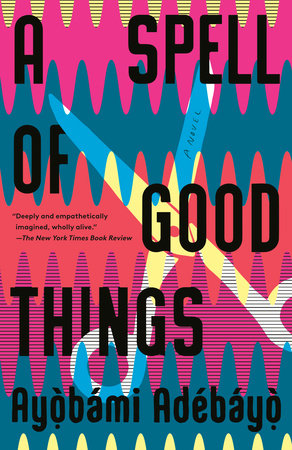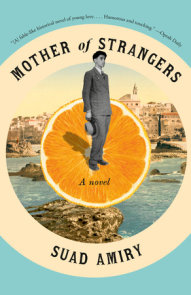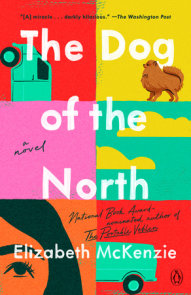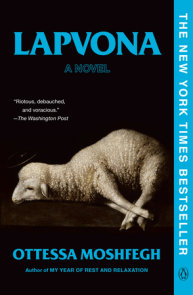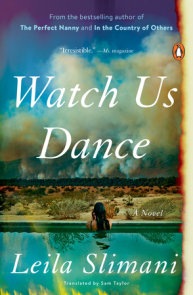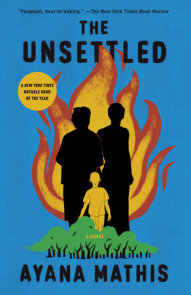READERS GUIDE
From Ayọ̀bámi Adébáyọ̀, the celebrated author of Stay with Me, comes A Spell of Good Things, a captivating story that follows two families of opposite fortune and the tragedy that will connect them forever.A history professor loses his job to government cuts and a new education plan. His son, Ẹniọlá, spurred by his father’s misfortunes, dreams of studying engineering to change his family’s fate. But as months pass by and his father is still unable to find work, Ẹniọlá will watch his dreams of higher education slip away as his family plummets into the depths of poverty with no clear way out. While his father sinks deeper into devastation and his mother struggles to put food on the table, Ẹniọlá begins his quest to pay his school fees, leading him from a job running errands for a local tailor to begging in the streets, to ultimately being recruited into the ranks of a powerful local politician offering quick money for a job he won’t understand until it’s too late.
A woman orders a dress from her local tailor and polishes her gold jewelry, preparing for her fiftieth birthday celebration, which will bring her family together from far and wide. Her daughter Wúràọlá, an overworked young doctor, will be returning from her understaffed and underfunded hospital to meet the equally fast-paced, high-pressure environment of her family home. Wúràọlá is approaching thirty and expected to be married to a man her parents approve of, someone like Kúnlé, the prosperous son of their closest family friends. Unbeknownst to her, Kúnlé’s volatile love and his father’s political ambitions will send Wúràọlá down a dangerous course that threatens her family and everything she holds dear.
Ẹniọlá and Wúràọlá’s paths will converge in this unforgettable and electrifying tale of love and family, revealing the inextricable connection between the haves and have-nots in modern Nigeria.
The following questions are designed to accompany your reading of A Spell of Good Things. We hope they spark thoughtful reflection, encourage riveting discussion and enrich your experience of this gripping work by Ayọ̀bámi Adébáyọ̀.
Questions and Topics for Discussion
1. Revisit the epigraphs that mark the novel’s four parts. How do they amplify the themes of the story and set the tone for each section? Consider exploring the works of T. M. Aluko, Chika Unigwe, Helon Habila and Teju Cole. How do they speak in conversation with Adébáyọ̀’s novel? Why do you think she selected them as structural elements of the text?
2. Ayọ̀bámi Adébáyọ̀ investigates topics such as class, education, family, gender, marriage and domestic violence in her fiction, and this novel touches on them all with complexity and nuance. What is one passage that stuck with you in particular, and why?
3. A Spell of Good Things tells the tale of two families whose lives become intertwined without relying on extended physical encounters between them. Revisit the moments when their paths do cross. How would you describe the exchanges? Why do you think Adébáyọ̀ chose to keep them brief yet impactful? What do these encounters reveal about the relationship between political elites and the working class in modern Nigeria?
4. Despite their different socioeconomic backgrounds, Ẹniọlá and Wúràọlá’s families both instilled in their children a high regard for education. Why do you think education was an important asset in this society? Do you think its emphasis harmed or hindered the different characters and relationships in the story?
5. Ẹniọlá’s mother is faced with the difficult decision to further the education of one of her children and not the other. What factors influenced her decision? Do you think she made the right choice?
6. Who is Aunty Caro? What is the significance of her connection to Ẹniọlá and Wúràọlá’s families? Why do you think Adébáyọ̀ chose to open and close the novel with her?
7. How would you characterize Yèyé’s fiftieth birthday party? Joyful and celebratory? Tense? What was your reaction to the party’s ending?
8. On page 163, Wúràọlá describes the feeling of being engaged to that of being a celebrity: beloved and valued. What do the reactions to Wúràọlá’s engagement reveal about the importance of marriage in this society? How do love, cultural customs and social class shape partnerships? Do all of the novel’s characters share the same views on marriage?
9. In the novel, Mọ́tárá repeatedly calls her sister “Saint Wúràọlá the Impeccable” (page 226). What are the expectations placed on Wúràọlá and Mọ́tárá as the young women of their family? How do they respond to these pressures? What do their reactions reveal about their own values?
10. A Spell of Good Things touches on the circumstances that keep women in both abusive and unsatisfying relationships in great depth. What forces keep Wúràọlá from coming forward with her experience of Kúnlé’s abuse? How would you characterize the reactions of her sister Mọ́tárá and the assumed reactions of her friends? Were they beneficial, or did they fail to fully comprehend the difficulty of her situation? How do the factors keeping Wúràọlá in her relationship compare to the reasoning provided by Yèyé and Ìyá Ẹniọlá for staying in their unhappy marriages? Are there any examples of admirable partnerships in the text?
11. The novel also sheds light on the experiences of men trying to live up to patriarchal standards of masculinity in a world where women are finding empowerment through greater levels of education and financial independence. What differences did you notice between the generation of the novel’s parents and their children related to gender roles and the place of women in society? How do the male characters, including Ẹniọlá and his father, Láyí, and Kúnlé, react to this shift?
12. Describe Kingsley. Why do you think he becomes a significant figure in Wúràọlá’s life as she reaches the turning point in her relationship with Kúnlé?
13. Central to the novel are the language, traditions and values of the Yoruba people in Nigeria. What did this add to the story and your experience of reading it? Why do you think it was important for Adébáyọ̀ to tell the story in this way?
14. Adébáyọ̀ writes that Yèyé “had never been able to shake the sense that life was war, a series of battles with the occasional spell of good things” (page 157). Reflect on the novel’s title. How does each character cope with this feeling of instability?
Suggested Reading
Stay with Me by Ayọ̀bámi Adébáyọ̀Dele Weds Destiny by Tomi Obaro
Half of a Yellow Sun by Chimamanda Ngozi Adichie
The Thing Around Your Neck by Chimamanda Ngozi Adichie
Little Fires Everywhere by Celeste Ng
Better Never Than Late by Chika Unigwe
Well-Behaved Indian Women by Saumya Dave
What a Happy Family by Saumya Dave
The Performance by Claire Thomas
The Death of Vivek Oji by Akwaeke Emezi
You Made a Fool of Death with Your Beauty by Akwaeke Emezi







